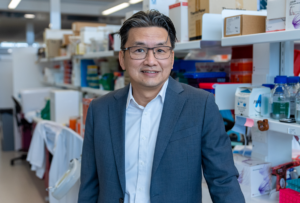We recently sat down with Professor Gary Lee, one of WA’s best and brightest researchers, to learn more about the exciting cancer research advancements in his field. Keep reading to find out more.

“We are an excellent example of how high quality research performed in WA can bring direct clinical benefits to local patients. A lot of our research studies and the subsequent results benefit West Australian patients first, before they are implemented in the rest of the world”, says Professor Gary Lee.
Based at the Institute for Respiratory Health and Sir Charles Gardiner Hospital, Gary Lee is a Professor of Respiratory Medicine at UWA and a lung specialist leading one of the busiest pleural clinics in the Southern Hemisphere. Professor Lee is a world leader in pleural research and has introduced revolutionary new practices to support cancer patients – especially those with lung cancer and mesothelioma – who suffer from the build-up of fluid around their lungs (called a pleural effusion).
His work has changed practice worldwide and has been included in many international guidelines for specialists. Cancer patients with a pleural effusion can now gain better control of their breathlessness, enjoy better quality of life and walk further, while spending fewer days in hospital.
Gary Lee began his research at a time when pleural effusion was something that specialists treated as a by-product of the illness. As a result of his and other researchers’ work, advances in the care of pleural effusion now makes it a recognised clinical specialty.
Pleural effusion can be caused by over 60 different illnesses, however, for those who have cancer, the fluid build-up is recurrent. The impacts include pain and difficulty in breathing, which require regular hospital visits to have fluid drained using interventions that have risks of serious complications (such as internal hemorrhage) or death.
Gary’s focus has been to integrate clinical care with high quality research. “What I’m trying to do is to merge the two together and show that you can deliver world-class care while doing cutting edge, pragmatic research that actually benefits people.”
The outcomes have been just that – cutting edge. Through a series of clinical trials titled the AMPLE (Australasian Malignant PLeural Effusion) trials, Gary has examined the use of an indwelling pleural catheter (IPC), a special fluid drainage device that enables the patient to remain at home while removing the fluid around their lungs. This contrasts with conventional methods, which require patients to come into hospital, have a tube put in, and wait a few days before returning home.
“The fluid often comes back again in two or three weeks, and the whole process has to be repeated.” In the first AMPLE clinical trial, cancer patients who had fluid around their lungs spent 11% to 12% of their time in hospital. That time is halved with the insertion of the IPC. Gary’s research also shows that by draining the fluid every day and keeping the chest dry, people are able to walk further, have better quality of life, and experience less breathlessness.
Gary’s current research is funded by a Cancer Council WA Research Project Grant. The AMPLE-4 clinical trial looks at how to reduce IPC infections by the regular application of an antibiotic cream around the site where the catheter is implanted. Cancer patients, especially those undergoing chemotherapy, have compromised immune systems, increasing their risk of developing an infection. Professor Lee’s randomised trial will be multi-centered and involve any cancer patients treated with indwelling pleural catheters.
The drive to find the next solution is a hallmark of Gary’s approach and has led to him being recognised globally for his work with pleural effusion. Yet, at the core of it all, Gary’s primary concern is how his next research project or clinical trial will benefit his patients.
“When patients come to see me, they want to know how to make the most of the remaining time they have, to live the best way they can. They accept there is no cure, but they want to breathe better, they want no pain, they want a minimal amount of time in hospital, minimal number of procedures, and they want to know what exercise and diet is going to help.”
Gary and his team, in conjunction with its strong allied health research component, ensure that patients get the best quality of care. Ultimately, this is what their work is all about. “The program is about quality of life and how you spend your days – it’s about making people breathe and live better”, Gary says.
Find out more
- Learn about our latest funding opportunities
- Donate to our cancer research projects